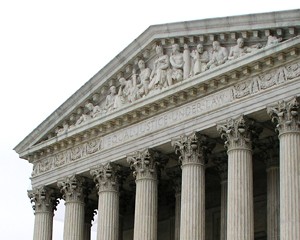
US passports are in the news again this week as the Supreme Court announced their decision on the “Jerusalem passport” case. In this case, Zivotofsky vs. Kerry, a 12 year old boy born to a US citizen mother sought to have his place of birth be listed as “Israel” on his US passport. We’ll look at this case in more detail, but first let’s consider how other places of birth are listed on US passports.
Travelers Born in the United States and US Territories
If you were born in one of the 50 United States, your passport will list your state of birth followed by “U.S.A.,” i.e. “Minnesota, U.S.A.” or “New Jersey, U.S.A.”
Born in the District of Columbia? Your passport will say “Washington, DC, U.S.A.”
If you were born in a US territory, your passport will show the name of that territory followed by “U.S.A.” For example, your passport may say “Puerto Rico, U.S.A.” or “Northern Mariana Islands, U.S.A.” The exceptions are “American Samoa” and the Virgin Islands, written as “U.S. Virgin Islands.”
Travelers Born Outside the United States
Whether you acquired your citizenship by naturalization or by birth to a US citizen parent, if you were born outside the United States, your passport will list your country of birth only. So if you were born in Paris, your US passport will say “Place of Birth: France.” If the country you were born in still has the same name as it did when you were born, that’s simple enough, but what if you were born in a country that no longer exists? State Department regulations require that the current name of the country that has sovereignty over your city of birth should be listed. This means that if you were born in Moscow in 1960, your US passport will list your place of birth as Russia, even though the country was the Soviet Union when you were born.
It gets a bit more complicated if you were born in a place that now is disputed territory or is part of a country that is not formally recognized by the United Nations or the United States. The US State Department’s Foreign Affairs Manual, which contains all the official guidelines for passports, devotes many pages to specifics on how certain new countries and disputed locations should be listed on passports. One interesting example is that of Taiwan, which is not officially recognized as a nation by either the United States or the United Nations. The regulations allow people born in the Taiwanese islands to choose for themselves whether they would like their passport to list the place of birth as “Taiwan,” “China,” or to list the city of birth only (i.e. “Taipei.”) In all other cases, the State Department is quite specific as to what country should be listed, although they allow travelers who object to that country name to use the “city of birth option,” meaning that they can list the city name only, with no country mentioned.
What if You Weren’t Born in a Country?
If you were born on a ship sailing in international waters, your passport will list your place of birth as “AT SEA”! Similarly, if your mother delivered you on a transatlantic flight, and the plane was over international waters when you arrived, your passport will say you were born “IN THE AIR.”
The Jerusalem Passport Case
The city of Jerusalem is not recognized by the United Nations as belonging to any one nation, as Israel, Jordan, and Palestinian forces all make claim to the city. US State Department regulations have long required that the “city of birth option” must be used for travelers who were born in Jerusalem. In 2002, the US Congress passed a law that US citizens born in the city of Jerusalem should be allowed to have “Israel” listed on their passports, although the “city of birth option” would remain available. President George W. Bush signed the bill into law as part of a larger package, but as both his administration and the Obama administration do not recognize Jerusalem as part of Israel, the State Department refused to enact this law.
The Supreme Court case was brought by the Zivotofsky family. In 2002, shortly after the congressional law was passed, a US citizen named Naomi Zivotofsky gave birth to a son, Menachem, in Jerusalem. Menachem is a US citizen by birth because his mother is a US citizen. The family tried to have Menachem’s US passport issued listing “Israel” as the place of birth, but government officials refused due to State Department policy, and issued his passport with “Jerusalem” as the place of birth. The Zivotovskys took it to the courts, all the way to the Supreme Court, and on Monday, June 8, 2015, the US Supreme Court ruled in favor of the US State Department.
The Supreme Court decision has struck down the 2002 congressional law, and upheld State Department and presidential policy. US citizens born in Jerusalem will continue to have “Jerusalem” listed on their passports until such time as the Middle East peace process makes clear which nation holds sovereignty over the city.
